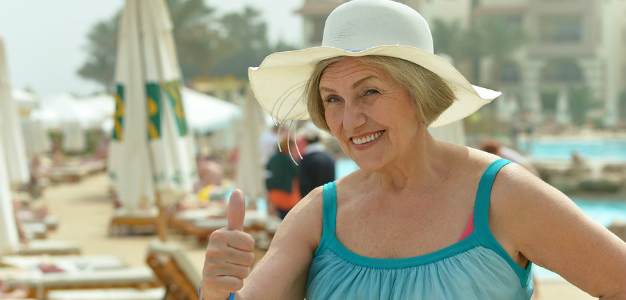It sounds like we’re in for tough temperatures over the next few months, and older bodies are less resilient in extreme conditions. Let’s be as prepared as we can.
We humans cool ourselves by sweating and by increased blood flow to the skin (which is why we go red in the heat). But with age we sweat less, and our circulation might be compromised.
This is especially the case if we have a condition that alters blood vessel or nervous system function, such as cardiovascular disease or diabetes. Certain medications also affect hydration and blood flow.
We have a problem if our body has difficulty releasing heat and our core temperature climbs too high. This seems to happen more readily in women, though it’s not clear why.
Of course, in many parts of Australia it’s not just heat we have to handle — it’s heat plus humidity, which can make it even harder to cool down.
Another issue is that with age our thirst mechanism mightn’t be as sharp as it used to be. As a result, we drink less and dehydrate faster.
Older people who are fit may manage better in the heat because their sweating and blood flow are more efficient. Hopefully, if they exercise, they’re also used to drinking water and replacing lost fluids.
So given this collection of issues that could reduce our heat resistance, how do we manage a scorching summer?
Of course, there’s air-conditioning, electric fans, and taking a dip in your private beach or luxury pool. But here’s a range of other ideas. Maybe they’re blindingly obvious, but they’re also often forgotten.
- Think about what you wear. People who live close to the equator aren’t decked out in nylon and polyester. Instead, they wear thin, loose clothing in light colours. So if you need new summer clothes look towards fabrics that breathe, such as cotton, linen, and bamboo.
- Keep cool, damp cloths in the fridge and put these around your neck and forehead.
- Spritz your face with cool water. A good idea to keep that in the fridge too.
- I’d add having a cold shower, though by summertime the water’s often warm, and if you live in humidity, you can’t get dry.
- When’s the last time you used a hand fan? If there’s one stashed in the back of a cupboard, dig it out.
- It goes without saying, but drink water. If you have a hard time remembering to do that, leave a jug of it somewhere obvious. Aim to drink a couple of litres a day; more if you’re sweating a lot. If you don’t like water, give it a flavour boost with sprigs of mint or slices of lemon or lime. Or carbonate it if you prefer bubbles. Coconut water and watery fruit and veg (cucumber, watermelon, mango) also help to keep us hydrated. And take your water bottle when you leave home. (Try to avoid bottled water though; that just adds to our plastic pollution.)
- Be wise with alcohol. Cold white wine might seem like the perfect answer to a hot day, but make sure you’re drinking lots of water too.
- Avoid the heat of the day as much as possible. If you’re not bound by office hours, consider the idea of a siesta. Start early and do as much as you can before the day heats up. If you’re doing something physical, take plenty of breaks and stay hydrated. Rest when the temperature is at its peak, then pick up your activity again in the late afternoon or evening.
- Protect yourself from the sun. Cover up, wear a hat, or shade yourself with an umbrella if you’re outside. (Wear sunscreen, of course, though it won’t make you any cooler.)
- Finally, if you feel dizzy, lightheaded, lethargic, or have a headache or a racing heart, assume it might be heat-related. Drink, cool down, and rest.
We mightn’t feel the full force of summer for some time, but we can be ready when it comes.
Photo Source: Bigstock

